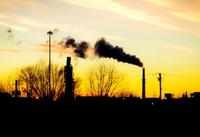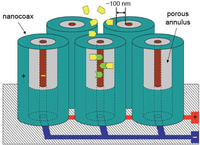-
Near-instantaneous DNA analysis
Polymerase chain reaction (PCR) is an indispensible technique allowing researchers and clinicians to produce millions of copies from a single piece of DNA or RNA for use in genome sequencing, gene analysis, inheritable disease diagnosis, paternity testing, forensic identification, and the detection of infectious diseases; PCR for point-of-care, emergency-response, or widespread monitoring applications needs to be very fast — on the order of a few minutes; this has now been achieved
-
-
Antibiotic residues in sausage meat may promote pathogen survival

Antibiotic residues in uncured pepperoni or salami meat are potent enough to weaken helpful bacteria that processors add to acidify the sausage to make it safe for consumption; sausage manufacturers commonly inoculate sausage meat with lactic-acid-producing bacteria; by killing the bacteria that produce lactic acid, antibiotic residues can allow pathogenic bacteria to proliferate
-
-
Cooling coal emissions would clean air, lower health, climate-change costs

In the United States there are about 1,400 electric-generating unit powered by coal, operated at about 600 power plants; the estimated health costs of burning coal in the United States are in the range of $150 billion to $380 billion, including 18,000-46,000 premature deaths, 540,000 asthma attacks, 13,000 emergency room visits, and two million missed work or school days each year; scientists estimate that implementing large-scale cryogenic systems into coal-fired plants would reduce overall costs to society by 38 percent through the sharp reduction of associated health-care and climate-change costs
-
-
DHS using Boston subway system to test new sensors for biological agents

Bioterrorism is nothing new, and although medicines have made the world a safer place against a myriad of old scourges both natural and manmade, it still remains all too easy today to uncork a dangerous cloud of germs; DHS’s Science and Technology Directorate (DHS S&T) has scheduled a series of tests in the Boston subways to measure the real-world performance of new sensors recently developed to detect biological agents
-
-
U.S. risks losing out to Asia in medical research
Medical research saves lives, suffering, and dollars — while also creating jobs and economic activity; the United States has long led the world, with hundreds of thousands of jobs and marketable discoveries generated by government research funding every year; this is now changing: strong, sustained growth in research spending in Asian nations contrasts with U.S. cuts and short-term approach, and a brain drain could result
-
-
No-till could help stabilize crop yields despite climate change
Reducing tillage for some Central Great Plains crops could help conserve water and reduce losses caused by climate change, according to studies at the U.S. Department of Agriculture
-
-
Napa Valley hospital employees fearful of new, wearable security system
Employees at a Napa Valley, California hospital are required to carry an alarm device on a lanyard around their necks; the alarm device is about the size of a smart phone and can send and receive signals during an emergency; after incidents in which psychiatric patients tried to choke employees by grabbing and twisting the lanyards, employees want other options for carrying the alarm device
-
-
CDC says West Nile virus outbreak worst in years
The Center for Disease Control(CDC) says that last year’s mild winter and a wet spring have contributed to the worst West Nile virusoutbreak since its initial detection in 1999; according to the CDC, as of 14 August, at least 693 cases that have been reported across the United States, including twenty-eight deaths
-
-
China’s food production characterized by corruption, health-threatening practices

A report on Chinese TV showed rotten peaches spiked with sodium metabisulfite to make the fruit look fresh, seasoned in bleaching agents and additives harmful to the human liver and kidneys, and pickled in outdoor pools surrounded by garbage; the peaches are then packed in dirty bags which were previously used to hold animal feed, and shipped off to big brand stores; trouble is, this story is typical of, rather than an exception to, food production practices in China
-
-
Simple new test combats counterfeit drugs in developing countries
The World Health Organization (WHO) estimates that at least 10 percent of the drug supply in developing countries consists of counterfeit medicines, causing thousands of deaths every year; many of the deaths occur among people who unknowingly take counterfeit antibiotics and anti-malaria medicines that do not contain the active ingredient to combat those diseases; in addition to lacking the active ingredient, counterfeit medicines may harm people by containing ingredients that are potentially toxic
-
-
World could be in for higher food prices
This has been one of the driest summers in American history, but the weather is not only affecting the United States; weak monsoons in India and other weather issues across the globe are affecting crops and could lead to higher food prices in 2013
-
-
Bacteria in tap water traced to the water treatment process
Most of the bacteria that remain in drinking water when it gets to the tap can be traced to filters used in the water treatment process, rather than to the aquifers or rivers where they originated; the findings could open the door to more sustainable water treatment processes that use fewer chemicals and, as a result, produce lower levels of byproducts that may pose health risks; eventually, the work could enable engineers to control the types of microbes in drinking water to improve human health
-
-
New technology combats global pandemic of drug counterfeiting
Drug counterfeiting is so common in some developing countries – in some studies, 50 percent of the drug samples from Southeast Asia have been counterfeit — that patients with serious diseases are at risk of getting a poor-quality drug instead of one with ingredients that really treat their illness
-
-
Bioprinting to help produce an edible cultured meat prototype
Modern Meadow is developing a fundamentally new approach to meat and leather production which is based on the latest advances in tissue engineering and causes no harm to animals; with funding from the Thiel Foundation’s Breakout Labs, they plan to apply the latest advances in tissue engineering beyond medicine to produce novel consumer biomaterials, including an edible cultured meat prototype that can provide a humane and sustainable source of animal protein to consumers around the world
-
-
Toilet Challenge, 1: Caltech’s solar-powered toilet wins Reinvent Toilet Challenge
The World Health Organization reports that 2.5 billion people around the globe are without access to sanitary toilets, which results in the spread of deadly diseases; every year, 1.5 million people, mostly those under the age of five, die from diarrhea; Caltech scientist awarded grant to develop solar-powered sanitation system
-
More headlines
The long view
What We’ve Learned from Survivors of the Atomic Bombs
By Nancy Huddleston
Q&A with Dr. Preetha Rajaraman, New Vice Chair for the Radiation Effects Research Foundation in Hiroshima and Nagasaki, Japan.
Combatting the Measles Threat Means Examining the Reasons for Declining Vaccination Rates
By Catherine Carstairs and Kathryn Hughes
Measles was supposedly eradicated in Canada more than a quarter century ago. But today, measles is surging. The cause of this resurgence is declining vaccination rates.
Social Networks Are Not Effective at Mobilizing Vaccination Uptake
By Laura Reiley
The persuasive power of social networks is immense, but not limitless. Vaccine preferences, based on the COVID experience in the United States, proved quite insensitive to persuasion, even through friendship networks.
Vaccine Integrity Project Says New FDA Rules on COVID-19 Vaccines Show Lack of Consensus, Clarity
By Stephanie Soucheray
Sidestepping both the FDA’s own Vaccines and Related Biological Products Advisory Committee and the CDC’s Advisory Committee on Immunization Practices (ACIP), two Trump-appointed FDA leaders penned an opinion piece in the New England Journal of Medicine to announce new, more restrictive, COVID-19 vaccine recommendations. Critics say that not seeking broad input into the new policy, which would help FDA to understand its implications, feasibility, and the potential for unintended consequences, amounts to policy by proclamation.
Are We Ready for a ‘DeepSeek for Bioweapons’?
Anthropic’s Claude 4 is a warning sign: AI that can help build bioweapons is coming, and could be widely available soon. Steven Adler writes that we need to be prepared for the consequences: “like a freely downloadable ‘DeepSeek for bioweapons,’ available across the internet, loadable to the computer of any amateur scientist who wishes to cause mass harm. With Anthropic’s Claude Opus 4 having finally triggered this level of safety risk, the clock is now ticking.”
“Tulsi Gabbard as US Intelligence Chief Would Undermine Efforts Against the Spread of Chemical and Biological Weapons”: Expert
The Senate, along party lines, last week confirmed Tulsi Gabbard as Director of National intelligence. One expert on biological and chemical weapons says that Gabbard’s “longstanding history of parroting Russian propaganda talking points, unfounded claims about Syria’s use of chemical weapons, and conspiracy theories all in efforts to undermine the quality of the community she now leads” make her confirmation a “national security malpractice.”
